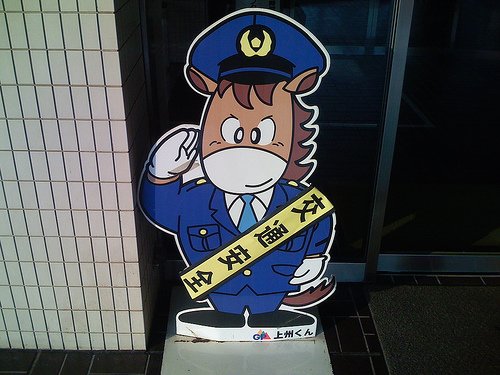Japan is, of course, the home of funny English. It’s everywhere, like a bizarre Matrix of Strangeness that pervades the very air around a foreigner living in the country, despite the inability of Japanese people to perceive it. You can see funny English when you look out your window and there’s a big truck with DUCK! printed on the side, or when you go to shave and notice that your shaving cream says “shake a can well,” or when you visit the public bath and notice that the air conditioner is called “Clean Poo.” You can feel it when you address a letter to a friend who lives in an apartment building called “Maison Cream Soda”… when you go to a coffee shop that advertises “flavorous and delicious communication”… when you crack open a beer and notice that it contains “esteemed quality with fine barley, malt, aroma hop and natural water.” Often funny English comes from marketing products to people, like the Paradise Hair Resort I happened across the other day, or the famous Pocari Sweat, designed to elicit the image of light clouds on a hot day (pokkari is a Japanese word that describes floating on air). Sometimes the funny English in question isn’t even made up of words, as in the case of a shirt I saw the other day that featured the famous “I (heart) NY” design, with the heart replaced by the GOP Elephant for no reason that we could comprehend. The Japanese are unique in that they generally learn a lot of English grammar and vocabulary — important for passing college entrance exams — but since it’s such an isolated country, there’s no real need for the language in day-to-day life. I guess is what leads to Japanese wanting to display English in so many odd ways.

Women from J-List’s home prefecture of Gunma have received a slap in the face from an article in the weekly magazine Shinkan Shincho which asked readers to rank females from Japan’s 47 prefectures according to beauty — and they came in last. Each part of Japan is famous for something, whether it’s soba noodles from Nagano or white rice and sake from Niigata or “Akita Bijin,” the beautiful girls from frigid Akita Prefecture, whose skin is so white because it’s too cold to go outside most of the time there. Gunma is famous for several things too, including yaki-manju, bread-like cake that’s coated with sweet miso sauce and cooked on a stick; daruma, those red round little things that bring good luck to your home or business; and really strong winds in the winter called kara-kaze (empty winds). Rather than being renowned for their beauty, Gunma’s females are famed for being extremely strong-willed, usually able to make their husbands do what they tell them to. These bossy Japanese females are known as kakaa-denka (kah-kah-ah DEN-kah), and this concept is such a staple of life in Gunma that there is — I am not kidding — a shopping street in our city called Kakaa Town where all the strong-willed housewives supposedly do their shopping. There are some theories about how Gunma women got to be so forceful, including the lack of a fishing industry in land-locked Gunma and the early growth of a silkworm cultivation which placed women in the role of primary breadwinner of the house. Or according to another theory, the strong winds caused women have to yell really loud to be heard, which made them lose their feminine characteristics.
Making errors when speaking a foreign language comes with the territory, and smart language learners will do what they can to embrace their own screw-ups as a positive way of moving forward with their language studies. At the very least, it’s important to avoid being so scared of making an error that you never open your mouth, which is a problem a lot of Japanese learners of English have. Wanting to avoid linguistic slip-ups, they prefer to pre-load their “brain cache” before speaking rather than just opening their mouth and letting the words fall out naturally. I’ve made plenty of large and small errors over the years, for example there was the time I confused the word hinan (to evacuate) with hinin (to use a contraceptive) in mixed company, and the standard problems of the word “mango” and a similar term that refers to the female reproductive parts, but everyone can make errors. Before I married my wife, we were planning what photographs we wanted taken at the wedding, and she kept asking us to take pictures of her standing on “the glass.” I couldn’t understand what she was saying — did she want a picture of herself standing on a reflective surface while wearing her dress? — but it turned out she was talking about the grass lawn in front of the chapel in San Diego. Poor Jun, J-List’s toy-and-snack buyer, had an embarrassing experience, too, while in Chicago ordering espresso from a Starbucks. The coffee was very bitter, so he shouted niga! (nii-GA), which means bitter in Japanese. All in all, this wasn’t the best thing to shout in the middle of a coffee shop in Chicago, considering the potential for misunderstanding. (A more standard word for bitter is nigai, “nii-GA-ee”; niga is a slang form of this word.)
Since J-List is physically located in Japan, we’re able to bring many amazing products to fans all over the world, and our revolving monthly magazine subscriptions are among our most popular items. Today we’re posting two new “Reserve Subscription” magazines for our otaku brethern, the popular Dengeki Maoh super-thick monthly manga magazine, and Dengeki Hime, a great mag about Japan’s oh-so-cute anime characters with just a little bit of “H.” Both are loaded with free stuff in each issue, from posters to mousepads and more. As with our other magazines, you can always get them on a month-to-month revolving basis, which means you can quit or switch from one magazine to another at any time, and there’s never any obligation. (You can also pre-pay for a year’s worth of issues and get one month free.) Why not give Japan’s most famous anime, fashion, toy, hobby or men’s magazines a try today?















